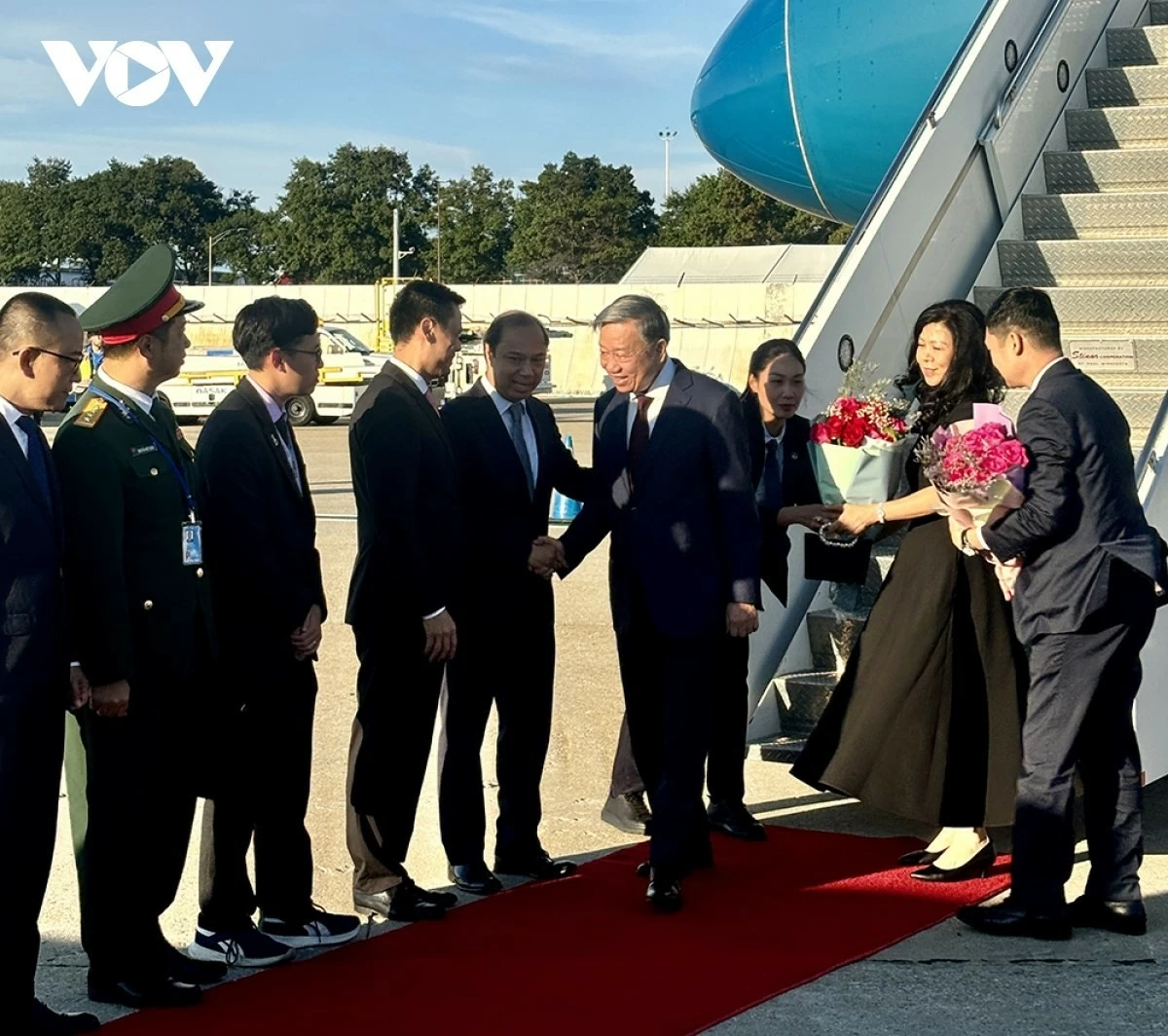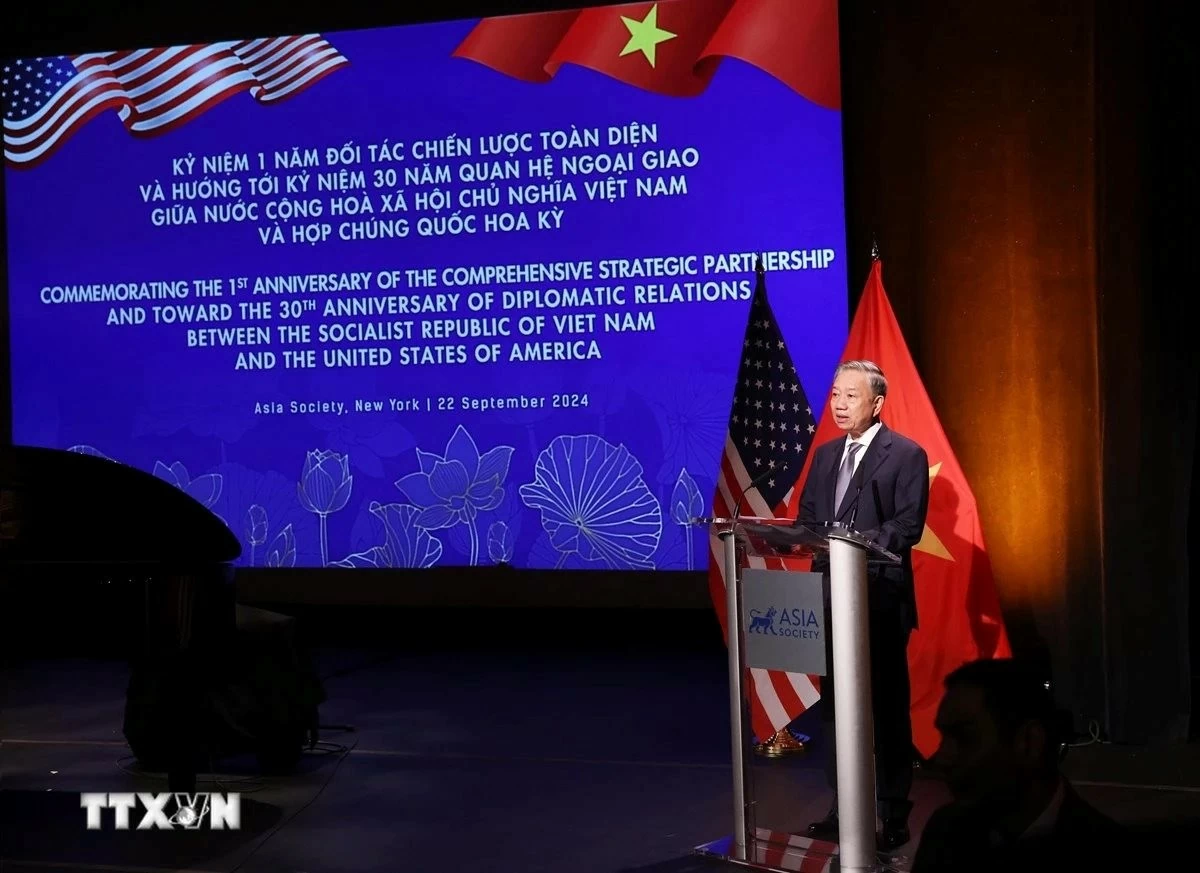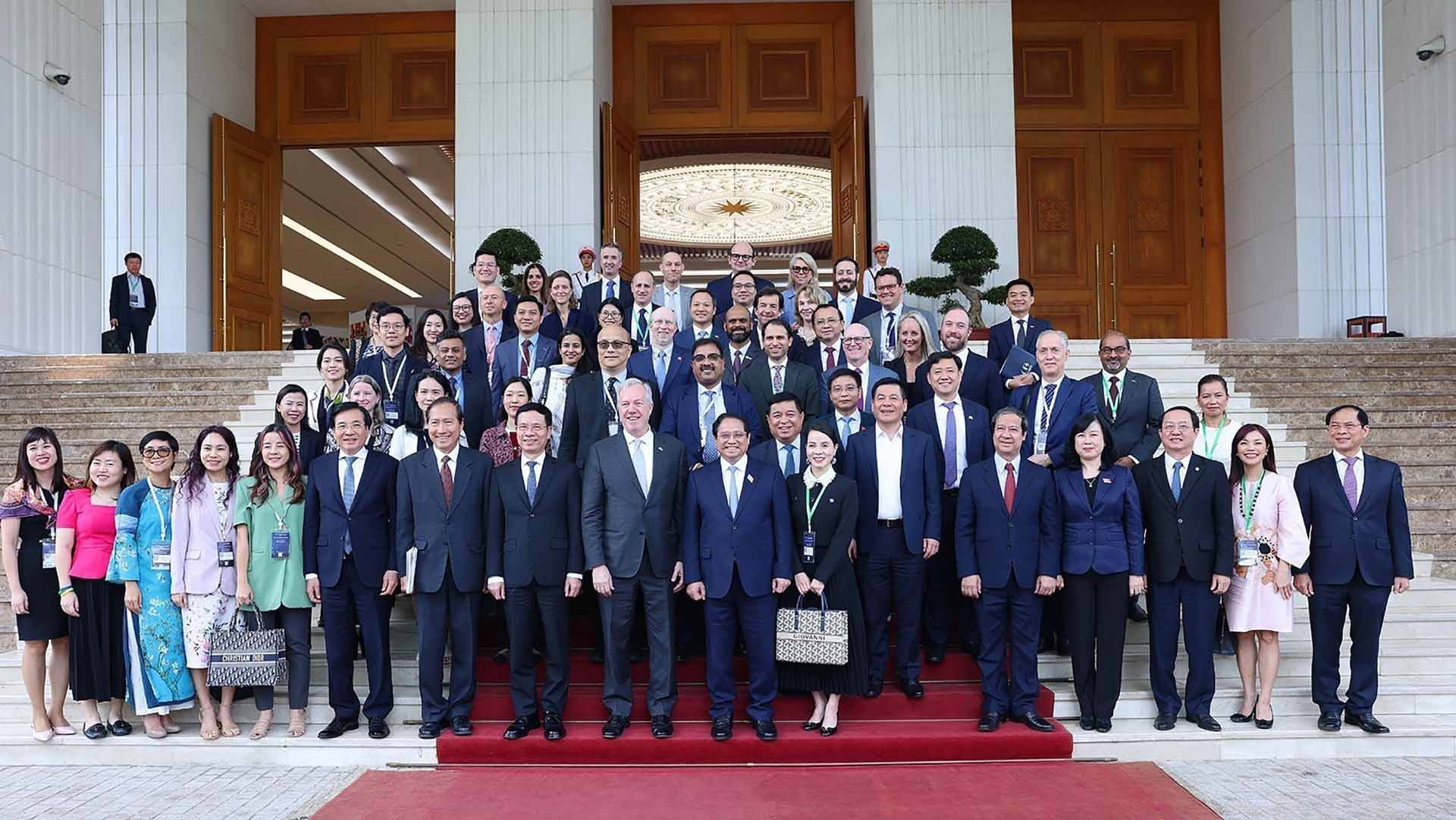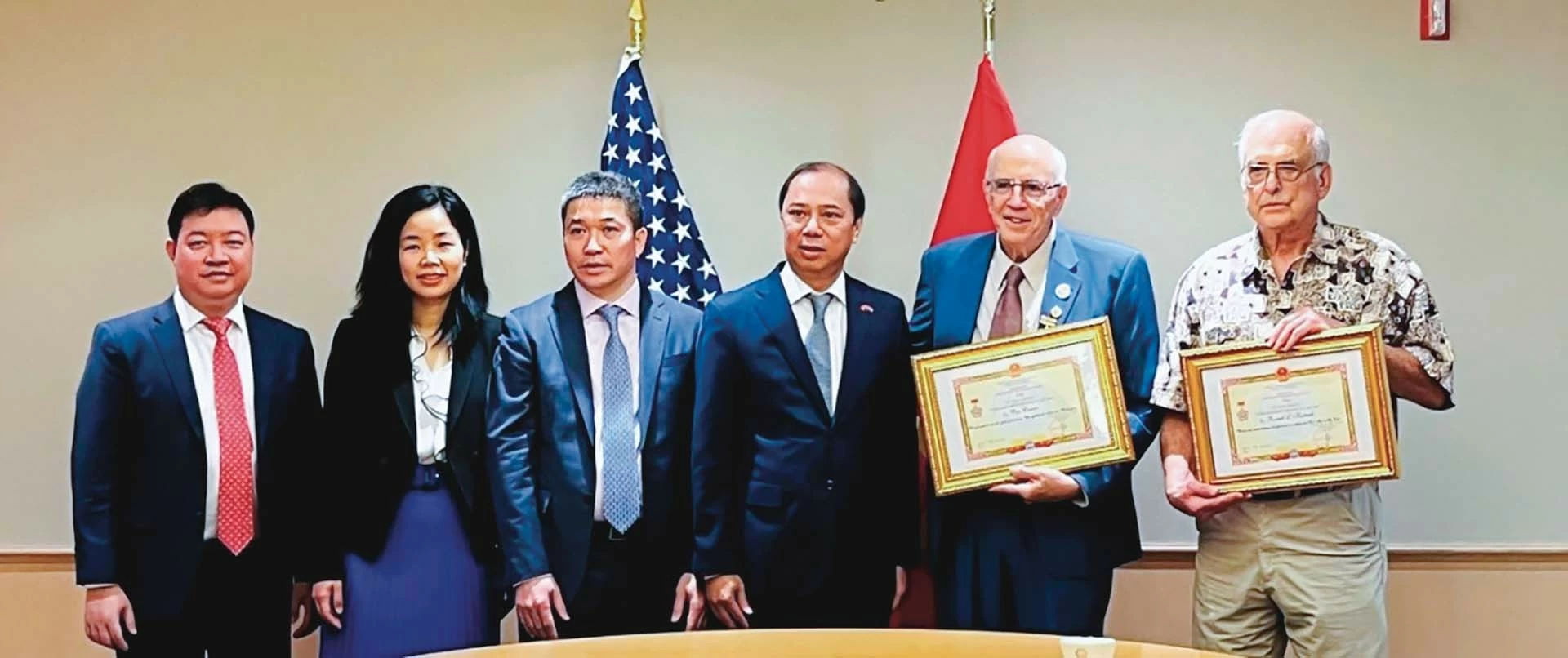
General Secretary and President To Lam's working trip to the U.S.: Strengthening momentum, weaving bonds of friendship
Latest
 |
| Ambassador Nguyen Quoc Dung welcomed General Secretary and President To Lam at J.F.Kenedy International Airport to begin activities to attend the Future Summit, the 79th Session of the United Nations General Assembly and work in the United States. |
What are the implications and focuses of the Vietnam - U.S. relations during the trip by General Secretary, President To Lam to attend the General Debate of the 79th United Nations General Assembly, the Summit of the Future, and bilateral working sessions in the United States?
The first working trip to the United States by General Secretary and President To Lam in his new position holds great significance. It provides an opportunity to reaffirm Vietnam’s foreign policy of independence, self-reliance, multilateralism, and diversification. As the United States prepares for its Presidential Election and a transition in leadership, the outcome of this visit will help maintain and foster the upward momentum in the Vietnam - U.S. relations in the years to come, while facilitating peace, cooperation, and progress in the region and the world.
Moreover, since Vietnam and the United States have just celebrated the first anniversary of the Comprehensive Strategic Partnership (CSP) for peace, cooperation, and sustainable development and are approaching the 30th anniversary of diplomatic relations, the trip to the United States is also an occasion for both countries to reflect on their shared journey, draw lessons, exchange valuable experiences on bilateral ties, and pay tribute to generations of friends who are making active contributions to the relationship.
Against this backdrop, General Secretary and President To Lam will have a diverse agenda in the United States, featuring a series of meetings and exchanges with American leaders and friends in the Government, business community, scholarly community, and Vietnamese diaspora. Notably, the General Secretary and President will preside over an event marking one year of the Comprehensive Strategic Partnership for peace, cooperation, and sustainable development toward 30 years of diplomatic relations. He will also deliver a policy address at Columbia University. Other members of the Vietnamese delegation will participate in bilateral activities with their American counterparts.
What are your assessments of both countries after one year of implementing the CSP?
The elevation of relation to a Comprehensive Strategic Partnership for peace, cooperation, and sustainable development have generated fresh impetus and energy for the bilateral relations. Joy is spreading across many departments, agencies, organizations, associations, and individuals, with high expectations and eagerness to implement the 10-pillar CSP. This was most clearly demonstrated through the robust exchange of delegations at all levels. Both sides established new dialogue mechanisms including Foreign Ministerial-Level Dialogue, Economic Dialogue, and Law Enforcement and Security Dialogue, thus expanding the institutional framework for cooperation. The U.S. delegations of state authorities, congressmen, businesses, and business associations have also paid visits to Vietnam. Particularly, the U.S. - ASEAN Business Council (USABC) sent their largest-ever delegation to Vietnam last March. Several documents and agreements were signed to materialize cooperation areas within the CSP framework such as culture, education, and people-to-people exchange. The United States remains committed to assistance programs for Vietnam in areas of common priority namely community healthcare, infectious disease prevention, climate change response, and energy transition.
 |
| General Secretary and President To Lam delivered a speech at the ceremony to celebrate the first anniversary of upgrading relations to Comprehensive Strategic Partnership, towards the 30th anniversary of establishing Vietnam-US diplomatic relations. |
Both sides are actively implementing key cooperation activities in the field of war legacy such as assistance to Agent Orange victims, detoxifying contaminated areas, clearing landmines and unexploded bombs, and searching for missing Vietnamese soldiers. In addition to these efforts, cooperation in education and culture is also being pursued. Like any bilateral ties in the world, the Vietnam - U.S. relations do encounter some hurdles. However, I am totally confident that with determination, commitment, and good will, both sides will seek a solution to overcome remaining issues, achieving greater successes in the bilateral ties toward 30 years of diplomatic relations and beyond.
Many believes that cooperation in economy, trade, and investment is the strongest testament to “the new vitality” in the CSP. What is you view on this?
It can be said that among 10 pillars of cooperation within the CSP, economic, trade, and investment cooperation is one of the most dynamic pillars, which has been further energized since the elevation of relationship.
From 50 million USD in 1995 when both sides normalized their relations, two-way trade turnover reached 111 billion USD in 2023. Despite headwinds from the pandemic, global economy and global trade, bilateral trade in the past three years surpassed 100 billion USD. During eight months of 2024, trade turnover increased by 20%-25%, making Vietnam the 7th largest import market of the United States, while the United States continues to be the largest export market of Vietnam... These results have proved that the elevation of relationship was a rightful decision. The results are both the recognition of remarkable progress in the bilateral economic ties and the driver to further solidify trust and enthusiasm in the business community of Vietnam and the United States.
 |
| Prime Minister Pham Minh Chinh met the US-ASEAN Business Council (USABC) delegation March 22, 2023. (Source: VNA) |
I note that the drivers for bilateral ties stem from strong commitment and determination of both countries’ high-level leaders, the Government, Ministries, departments, and localities. They are dedicated to implementing high-level agreements and connecting both countries’ businesses. They are also ready for dialogue to tackle difficulties in the bilateral ties. Both countries’ businesses pay tremendous attention to and aspire to enhance trade and investment and explore cooperation opportunity in emerging areas such as artificial intelligence, semi-conductor, renewable energy, high-tech agriculture, and transportation.
However, the implementation of high-level commitments faces certain barriers due to differences in the two countries’ regulations and procedures. Both sides should narrow these differences through dialogue and mutual support to find optimal solutions. The Government, localities, and businesses are determined to bolster economic cooperation with the United States, thereby strengthening the overall bilateral relations.
How do these American friends of Vietnam help weave the bonds between the two countries today and in the future?
Since the beginning of my tenure, I have had the opportunity to meet many American friends of Vietnam and to visit and work in several states. These interactions have left me with the impression that a majority of Americans hold affection for Vietnam. They admire the Vietnamese people, citizens of a small yet courageous and resilient nation, who are also kind, compassionate, and forgiving, willing to put the past behind them and look to the future. Notably, those Americans who experienced the war continue to keep Vietnam close to their hearts and express a strong desire to compensate for the country.
 |
| Ambassador Nguyen Quoc Dzung handing the insignias “For peace and friendship among peoples” to Professor Ron Carver and former war correspondent Ronald Haeberle (June 2023). (Source: Vietnamese Embassy in the United States) |
We have long been familiar with late Senator John McCain, former Senator John Kerry, and former Senator Patrick Leahy. Whether in office or retirement, they have consistently followed developments in Vietnam and remained committed to strengthening the Vietnam - U.S. relations. Many other American friends quietly contribute to this relationship, engaging in fundraising activities to support Vietnamese children or assist in the search for missing Vietnamese soldiers. For the younger generation, I always encourage them to visit Vietnam, so they can witness firsthand, experience, and understand the peace-loving and hospitable of Vietnam.
The responsibility to advance the Vietnam - U.S. relations does not rest solely on the two Governments but also on the people of both nations. Strong people-to-people ties are essential in fostering political relations. In fact, the bonds between our peoples played a crucial role in the normalization of relations in the past and the successes we see today. We are fortunate to have built friendship with a generation of Americans who hold Vietnam dear. Moving forward, we need to strengthen and expand relations with a new generation of Vietnam-friendly Americans who share common interests and are committed to supporting Vietnam’s continued rise in a new era.











